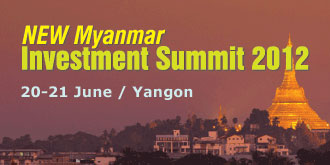Western countries will make up the top investors in Burma after a new investment law is signed by the government, following the removal or suspension of sanctions by many countries, senior officials of the Ministry of National Planning & Economic Development told the New Myanmar Investment Summit in Rangoon on Wednesday. Mizzima Media is a media partner of the summit.
 “Western countries will be the top investors in Myanmar in the coming years,” said Dr. Kan Zaw, the deputy minister for Ministry of National Planning & Economic Development, replacing China and Thailand, currently the top investors.
“Western countries will be the top investors in Myanmar in the coming years,” said Dr. Kan Zaw, the deputy minister for Ministry of National Planning & Economic Development, replacing China and Thailand, currently the top investors.
Total foreign investment in Burma reached US$ 40.699 billion in 458 projects as of March 2012, since the country opened to foreign investments in late 1988, according to official figures. “Until 2012, China stands as the top investor in Myanmar with about $30 billion in investments,” Kan Zaw said. Other top countries are Hong Kong and South Korea.
“In the coming years, Singapore is expected to be another large investors,” he said.
The minister said the government’s new investment law would put Burma in line with international standards and make it more competitive with other countries in the region.
“The new investment law will allow foreign companies do business in Myanmar for 70 years in total, with extensions step by step on investment permits,” he said.
He quoted a Burmese saying, “The more pleasant the house, the more guests will come.”
Foreign companies will not be allowed to recruit unskilled foreign workers and local citizens must make up at least 25 per cent of the skilled workforce after five years, he said. The percentage of Burmese workers' must be at least 50 per cent after 10 years and 75 per cent after 15 years.
The new law will require foreign companies to train and use Burmese workers year after year so native citizens will have a better chance to get jobs and attain skills, he said.
With the new law, he said foreign companies will need to invest at least 35 per cent to establish joint venture companies with Burmese companies or ministries as partners.
The new law will also encourage foreign companies to invest in electrical power production in cooperation with local private entrepreneurs, business groups or government departments or ministries.
Over 300 delegates from over 250 foreign companies attended the two–day business summit, coming from the United States, Italy, Canada, the United Kingdom, Japan, India, China, Vietnam, Singapore, Thailand, Cambodia, Malaysia, Sri Lanka, Indonesia, and Bangladesh.
Kyaw Zaw Maung, the director of Investment and Company Administration, said, “Despite more investment expected from western countries, former investors such as Chinese entrepreneurs will still have good chances to find local partners to establish joint venture companies because they have had close business contacts and they have more knowledge about doing business in Burma.”
To do business, foreign companies must exchange their currency for kyat, he said.
Under the new investment law foreign companies will be allowed to own companies 100 per cent or to set up joint ventures with local citizens or government departments with involvement of at least 35 per cent foreign capital.
The law sets different standards for various sectors, he said. For example, in import/export trade, the Ministry of Commerce will only allow joint venture investments and foreign companies must find local partners, he said.
The foreign companies will get a 5-year tax exemption and will be able to import raw materials and machinery to be used in their enterprise with no tax or custom’s duties.
After the 5-year tax exemption, tax holidays for foreign investment companies will also be considered by the Myanmar Investment Commission (MCI), he said.
“MIC will consider tax holidays if the joint venture or foreign investment companies are not making profits during the first 5-year investment period in the country, but they will have to pay certain taxes,” he said.
Foreign investors will be permitted to lease land from both the state and private citizens with an initial lease of up to 30 years, with additional 15-year extensions up to 70 years.
To lease land in the agriculture sector, foreign companies will have to get approval from the Irrigation Department under the Ministry of Agriculture to lease cultivated land or virgin land, he said.
“For the mining sector," he said, "the companies will have to meet with the Ministry of Mining Industry for locations for the project sites in their respective areas."
After discussions among lawmakers, the new foreign investment law bill is expected to be approved during the fourth parliamentary session that begins on July 4, he said.


